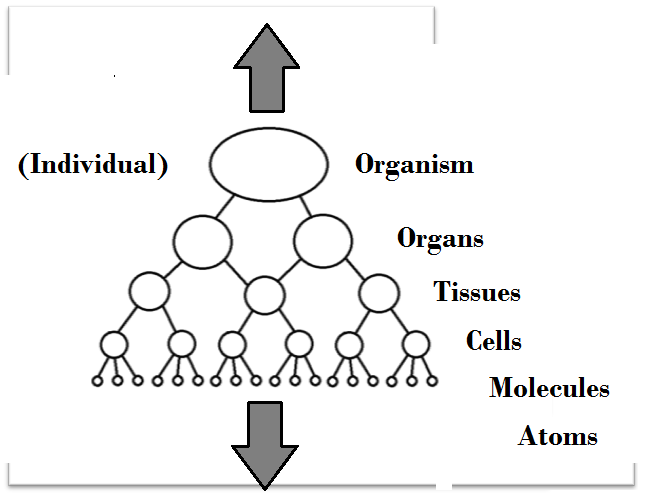The matter or “material cause” of human bodymind consists of the cells who interact to carry on the body-process, which in turn organizes itself in several levels intermediate between the cellular and organism levels.
 Yet each cell has its own life or identity, constituted by still smaller-scale molecular interactions; and we ourselves form the substrate of larger-scale entities, such as communities and ecosystems. At that level, the dialogue of which this book is a minute part may constitute the thoughts of a “global brain,” expressed in a vast language we humans can only imagine by analogy with human languages. But its context is beyond our comprehension. Is there a being for whom “the Great Conversation” is an internal dialogue?
Yet each cell has its own life or identity, constituted by still smaller-scale molecular interactions; and we ourselves form the substrate of larger-scale entities, such as communities and ecosystems. At that level, the dialogue of which this book is a minute part may constitute the thoughts of a “global brain,” expressed in a vast language we humans can only imagine by analogy with human languages. But its context is beyond our comprehension. Is there a being for whom “the Great Conversation” is an internal dialogue?
At the scale of the human bodymind, all the buzzing business inside your brain serves the purpose of your understanding, and none of your neurons has any idea of that, even though they constitute it with their interaction. But what if all the human dialogue, including the crosstalk of the Internet and all the global media, is just the inner working of a global brain, working as a guidance system within the global body? What if the human collective, or Gaia perhaps, is doing the real meaning, even though we constitute it by interacting?
This may be an appealing idea, since we long to be part of something bigger than ourselves, to serve a higher purpose – this is part of our heritage as social animals. But we can at best imagine such ‘higher purpose’ – as we are now doing – within the limitations of a human organism. As St. Thomas Aquinas put it, ‘Things known are in the knower according to the mode of the knower’ (Swidler 1999, 9). Drawing upon the repertoire of human-scale experience, we might imagine Humanity or Gaia or God like a wise and nurturing parent – or we might imagine that this higher-level being cares about us no more than an anthill cares about the feelings of its ants.
Let imagination do its wild work, and let our humble dialogue probe and push the envelope of knowledge.
In her book “A God that could be Real” Nancy Abrams argues quite convincingly that human beings have demonstrated “god capacity” for thousands of years. Now that we are approaching a more truthful verifiable conception of the universe and our amazing journey from cosmic dust to our current level of self consciousness, she says we need to reexamine our concept of God, which she defines as an emergent phenomenon derived from the collective aspirations of all human beings. She proposes a “planetary morality” and the enthusiastic use of this powerful non-sectarian superconsciousness (“God”) to guide actions which would save the incredible planet earth and the consciousness it supports from destruction.
Thanks, Roy, I hadn’t heard of Nancy Ellen Abrams before. Her “superconsciousness” seems to be Gaia, God and Humanity all rolled up into one. I see her book has its own website and is available in a Kindle edition, for those who want to check it out further.
I wonder whether, in order to have a concept of God that delivers a “planetary morality,” we need to give up the element of inscrutability in our God-concept. Well, God knows, as they say! Anyway, as a Baha’i, i’m happy to see new expressions of a non-sectarian spiritual impulse that is conducive to community-building on every scale.
Here are a few quotes from Baha’u’llah that guide Baha’is at this time on the planet:
The well-being of mankind, its peace and security, are unattainable unless and until its unity is firmly established.
Blessed and happy is he that ariseth to promote the best interests of the peoples and kindreds of the earth.
The essence of all that We have revealed for thee is Justice, is for man to free himself from idle fancy and imitation, discern with the eye of oneness His glorious handiwork, and look into all things with a searching eye.